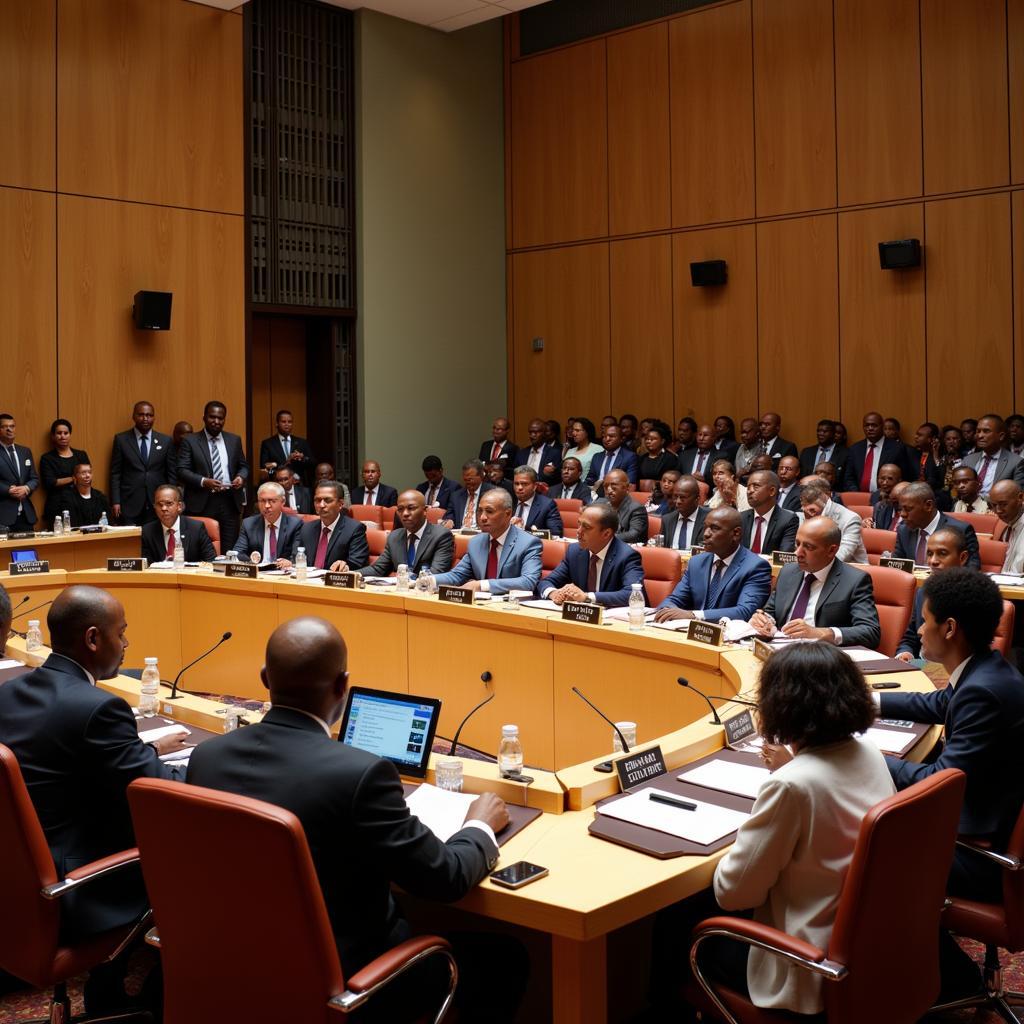A Short Note on the African Union
The African Union (AU), established in 2002, is a continental body consisting of 55 member states that make up the countries of the African continent. The AU’s purpose is to accelerate the political and socio-economic integration of the continent. This short note will delve into the history, structure, and key objectives of this vital organization.
A Brief History of Pan-Africanism and the Formation of the AU
The roots of the African Union lie in the Pan-Africanist movements of the early 20th century. These movements, driven by prominent figures like W.E.B. Du Bois and Marcus Garvey, advocated for the unity and liberation of African peoples. The Organization of African Unity (OAU), formed in 1963, was a crucial step towards achieving this vision. The OAU played a significant role in the fight against colonialism and apartheid. However, by the late 1990s, there was a growing consensus that the OAU needed to evolve to address the challenges of a post-colonial era. This led to the formation of the African Union in 2002, with a renewed focus on development, democracy, and good governance. This shift marked a crucial turning point in the pursuit of a unified and prosperous Africa.
Do you know what it was like for African countries in the 1980s? Find out more here: african countries 1980s.
The Structure and Objectives of the African Union
The African Union is structured similarly to other international organizations, with various bodies working together to achieve its goals. The Assembly of Heads of State and Government is the supreme organ of the AU, responsible for making key decisions. The Executive Council, composed of ministers designated by member states, implements the Assembly’s decisions. The African Union Commission, headquartered in Addis Ababa, Ethiopia, acts as the secretariat and administrative arm of the AU. Other key organs include the Pan-African Parliament, the African Court of Justice, and the Peace and Security Council. The AU aims to promote peace, security, and stability across the continent. It works to eradicate poverty and promote sustainable development. Furthermore, it seeks to accelerate the political and socio-economic integration of the continent, fostering cooperation among member states and strengthening their collective voice on the global stage.
What are the Key Achievements of the African Union?
The African Union has achieved notable milestones since its inception. It has played a crucial role in conflict resolution and peacekeeping efforts, deploying missions to address crises in various parts of the continent. The AU has also championed development initiatives, focusing on areas such as infrastructure, agriculture, and health. Furthermore, the AU has actively promoted democracy and good governance, advocating for free and fair elections and respect for human rights. The establishment of the African Continental Free Trade Area (AfCFTA) is a landmark achievement, aiming to create a single continental market for goods and services.
The African green broadbill is a vibrant reminder of the continent’s rich biodiversity. african green broadbill.
What are the Challenges Facing the African Union?
Despite its achievements, the African Union faces numerous challenges. Funding remains a significant constraint, limiting the AU’s capacity to effectively implement its programs. Furthermore, the AU’s effectiveness is often hampered by the principle of non-interference in the internal affairs of member states. This can make it difficult to address issues such as human rights violations and unconstitutional changes of government. Finally, the diverse political and economic landscapes of member states present a challenge to achieving consensus and implementing continent-wide policies.
 Leaders at an African Union Summit
Leaders at an African Union Summit
“The African Union represents the hope and aspirations of millions of Africans,” says Dr. Amina Omar, a prominent political analyst based in Nairobi. “While challenges remain, the AU’s commitment to unity and development offers a pathway to a brighter future for the continent.”
Conclusion
The African Union, a testament to the enduring vision of a unified and prosperous Africa, continues to play a crucial role in shaping the continent’s destiny. While significant challenges persist, the AU’s commitment to peace, security, and development remains unwavering. The African Union represents a vital platform for collective action and a symbol of hope for a brighter future for all Africans. More information about Africa’s defense strategies can be found here: african defence secret missiles. For those interested in the diverse fauna of the continent, take a look at the african stonechat. And lastly, for those interested in African cinema, check out african bf short.
FAQ
- What is the main goal of the African Union? To promote unity and solidarity among African states.
- How many countries are members of the AU? 55
- Where is the headquarters of the African Union? Addis Ababa, Ethiopia
- When was the African Union established? 2002
- What is the AfCFTA? The African Continental Free Trade Area
- What was the predecessor to the African Union? The Organization of African Unity (OAU)
- How does the AU promote peace and security? Through peacekeeping missions and conflict resolution efforts.
When you need assistance, please contact us: Phone: +255768904061, Email: kaka.mag@gmail.com or visit our address: Mbarali DC Mawindi, Kangaga, Tanzania. We have a 24/7 customer service team.


